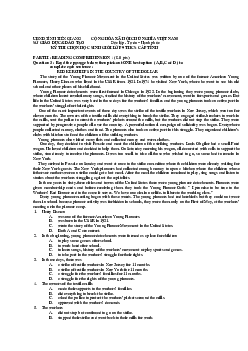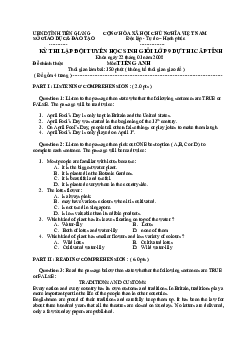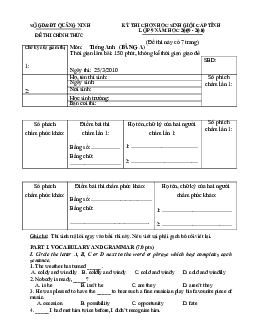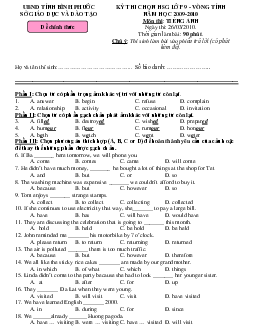





Preview text:
SỞ GIÁO DỤC VÀ ĐÀO TẠO KỲ THI HỌC SINH GIỎI CẤP THÀNH PHỐ LỚP 9 – THCS
TP HỒ CHÍ MINH KHÓA NGÀY: 23/3/2011 – NĂM HỌC: 2010-2011 MÔN: TIẾNG ANH
Thời gian làm bài: 150 phút ĐỀ CHÍNH THỨC Đề này gồm 4 trang
PART ONE. LISTENING (15 pts)
Recording One: Listen to the recording carefully, then decide whether each of the statements is True or False. Write TRUE
or FALSE in your Answer Sheet.
1. Marcus was tired after having some swimming practice yesterday.
2. Catherine finds it hard to understand why Marcus has so much homework.
3. Marcus agrees that he could change his weekend activities.
4. Marcus enjoys going out with his friends at the weekend.
5. Catherine thinks visiting the museum was a good experience for Marcus.
6. It often takes Marcus about an hour or so to do his homework. .
7. Catherine offers to show Marcus the maths homework she has already done.
8. Marcus worries that his teacher might be angry if Catherine helps him.
9. Catherine suggests having a competition between them in order to work faster.
10. After talking to Catherine, Marcus feels more confident about his homework.
Recording Two: Listen to the recording carefully, then, on your answer sheet, write a short answer to each question about the passage.
6. Which desk at the airport is the man now?
7. What flight did the man arrive on? 8. When is his return flight?
9. Who is he going to stay with?
10. Which other city does he want to see during his stay in Boston? PART TWO: USE OF ENGLISH
Choose the word or phrase (A, B, C, or D) that best completes the sentence. (20 pts)
1. The more _______, the better the result will be.
A. you put in your effort B. efforts you make C. you make an effort D. of your efforts
2. It‟s about time _______ more careful in his work. A. that Pete be B. Pete were C. for Pete being D. Pete was
3. They _______ for their coming examination. A. ought to be prepared well B. had prepared better
C. had better be well-prepared
D. should have been better prepared
4. Doctors advise _______ less fat in your diets. A. to take in B. taking in C. you taking in D. for you to smoke
5. If only we _______ it differently. A. did B. had done C. would do D. are doing
6. It was the first time _______ to a science center. A. I‟d been B. I was C. I would have been D. I was being
7. They decided to name the new baby boy _______ Grandpa. A. of B. after C. with D. as
8. Would you please _______ from smoking until you are out of the airport building? A. refrain B. exclude C. resist D. restrain
9. Though twin sisters, they are poles _______. A. away B. different C. apart D. afar
10. ______ in his back that he couldn‟t sleep. A. Such was the pain B. So was the pain C. Such a pain was it D. So painful it was
11. The minister stated that no real alternative _______ the plan existed. A. to B. for C. with D. on
12. It seems that your teacher is _______ fault in this case. A. under B. with C. for D. at
13. I expect the new trend will soon _______ here. A. come along B. catch on C. take up D. identify with
14. The teacher _______ great emphasis on learning vocabulary. A. makes B. puts C. does D. gives BLOGCHUYENANH
15. The child _______ his father.
A. bears a striking resemblance to B. stands to reason with C. makes a point of D. goes under the knife of
16. The girl _______ becoming a supermodel. A. loses touch with B. has her heart set on C. has a voice in D. is rained out of
17. We don‟t have cupboards so we _______ boxes. A. do away with B. make allowance for C. make do with D. keep an eye on
18. The scheme is too expensive to be _______ at the present moment. A. compatible B. liable C. feasible D. accessible
19. A: “We‟d be better off staying in that youth hostel!” B: “________” A. It‟s far from the truth. B. I‟m not convinced! C. Let‟s find one now. D. Thank you very much. 1 20. A: “________”
B: “And you. See you around.” A. Nice talking to you. B. Never mind. I‟m just OK.
C. I‟m fine. Thank you very much. D. It‟s my pleasure! Word Forms
A. Use the correct form of the word given to fill in each blank. (10 pts)
1. As a result of her good _______, she‟s made a lot of achievements in her life. (bring)
2. His success in the field of mathematics is _______. (phenomenon)
3. _______, this TV program should be carefully censored. (educate)
4. Several _______ have been eliminated so far. (contest)
5. _______ is the study of animals and their behaviors. (zoo)
6. The city council is thinking of building a(n) _______ system. (ground)
7. His contribution to the development of sports makes him a(n) _______ figure. (replace)
8. He bought that tie in a _______ shop at the airport. (duty)
9. In all _______, they will be successful in their project. (probable)
10. The composition should be _______; there may be spelling mistakes in it. (read)
B. Put the words given in the correct blanks. You have to use their correct forms to make a meaningful
passage. There are two extra words that you cannot use. (20pts) flight analyze inclusion interpret practice color memory consist relate condition long compete
We have dreams (1)_______ every night. Some of these dreams are remembered vividly. Other dreams, however,
are forgotten as soon as we wake up. Contrary to what some people believe, our dreams are not „messages‟ from beyond.
Neither do they tell us anything about our future. Instead, what you dream of at night is probably (2)_______ to your
experiences during the day. For instance, if you had spent a (3)_______ day at the beach, you may dream about your day‟s experience as you sleep.
Our dreams may also have something to do with our fears and (4)_______. For example, if you long to win first prize
in a high-jump contest, you may dream of yourself winning the (5)_______. Finally, our „external‟ environment may also affect
our dreams. If we are hungry, cold or thirsty, our dreams may (6)_______ these feelings. For example, if I sleep in a very cold
(7)_______ room I may dream that I am on an expedition to the North Pole.
People known as (8)_______ study and analyze dreams psychologically. For instance, they may say that if you
dream of (9)_______ in the sky you are a person who desires power. Of course, these (10)_______ may not be accepted by everyone.
PART THREE. CLOZE TESTS
Read the passage and choose the best option (A, B, C or D) for each blank space.
PASSAGE A (15 pts)
British families started going on holiday to the seaside around the middle of the 19th century. The invention of the
railways (1)______ this possible. The first holidaymakers were quite rich and went for their health and education. The seaside
was a place to be (2)______ of illnesses, and doctors recommended bathing in the sea and drinking sea water. Also to
(3)______ their knowledge, families attended concerts and read books from libraries.
At that time, ordinary working people had very little time (4)______. However, in 1871, the government (5)______ four
„Bank Holidays‟ – national holiday days. This (6)______ people to have a day or two out, which (7)______ gave them a
(8)______ for leisure and the seaside. At first they went on day-trips, taking (9)______ of special cheap tickets on the
railways. By the 1880‟s, rising incomes (10)______ many ordinary workers and their families could have a week‟s holiday at
the seaside. Rail (11)______ were reduced and cheap hotels were built to (12)______ them. Holidaymakers enjoyed being
(13)______, sitting on the beach, bathing in the sea, and eating ice-cream. Cheap entertainment was (14)______ offer and
holidaymakers went to have fun.
Today, the English seaside (15)______ popular, with more than 18 million holidays taken there each year. 1. A. let B. made C. got D. had 2. A. cured B. remedied C. recovered D. improved 3. A. raise B. spread C. increase D. add 4. A. out B. off C. away D. from 5. A. installed B. presented C. introduced D. brought 6. A. allowed B. provided C. offered D. opened 7. A. hardly ever B. here and there C. seldom D. now and then 8. A. taste B. sense C. favour D. pleasure 9. A. benefit B. opportunity C. advantage D. profit 10. A. caused B. produced C. meant D. resulted 11. A. fees B. bonuses C. fares D. tolls BLOGCHUYENANH 12. A. accommodate B. board C. cater D. lodge 13. A. idle B. easy C. restful D. spare 14. A. in B. for C. to D. on 15. A. remains B. stays C. continues D. lasts
Fill in each of the blanks in the following passage with ONE suitable word.
PASSAGE B (30 pts)
In the 1960s, The Beatles were probably the (1)______ known pop group in the world. Since then, (2)______ have
been a great many groups that have achieved enormous fame, so it is perhaps difficult now to imagine (3)______ sensational
The Beatles were at the time. They were four boys from the north of England and (4)______ of them had any training
(5)______ music. They started by performing and (6)______ songs by black Americans and they had some success with
these songs. Then they started writing their (7)______ songs and that was when they became really popular. The Beatles
changed pop music. They were the first pop group to achieve great success from songs they had written (8)______. After that 2
it became (9)______ for groups and singers to write their songs. The Beatles did not have a long (10)______. Their first hit
record was in 1963 and they (11)______ up in 1970. They stopped doing live (12)______ in 1966 because it had become too
dangerous for them – their fans‟ excitement was (13)______ that they surrounded them and tried to take their clothes
(14)______ souvenirs! However, today some of their songs (15)______ as famous as they were when they first came out.
Throughout the world, many people can sing part of a Beatles song if you ask them. PASSAGE C (30 pts)
Although the rise in the global temperature by 4 per cent predicted by many scientists (16)______ not sound like
much, it is the difference between now and the last Ice (17)______, when huge glaciers covered Europe and most of Britain.
(18)______ knows exactly what would happen on a warmer world, but we (19)______ know some things. Heat the kettle and
the (20)______ inside it expands. The temperature of the world has climbed more than half a (21)______ this century, and the
oceans have (22)______ by at least 10 cm.
But just as it (23)______ several minutes for a kettle to begin warming, it may have taken the oceans thirty years to
swell. This (24)______ that the global warming we are now experiencing is a result only of the carbon dioxide we have
dumped (25)______ the atmosphere up to the 1960s. Since then, the use of (26)_____ fuels has increased rapidly.
Scientists working for the United Nations and European governments have been warning that (27)______ the Dutch
and the people of East Anglia will need to do wil be to build more extensive sea defenses. Many of the world‟s great cities are
at (28)______, because they are located at the sea level. Miami, (29)______ entirely built on a sandbank, could be swept
away. But the effects of rising sea levels will be much (30)______ for the developing countries. With a meter rise in sea levels,
200 million could become homeless.
PART FOUR. Reading Comprehension (40 pts)
Choose the item (A, B, C or D) that best completes the unfinished statement about the passage. PASSAGE A
Thomas Edison, an inventor of the late 1800's, always said that the phonograph was his only real discovery, the only
invention he stumbled upon rather than deliberately set out to find. Having invented it, he then had to find a use for it. Musical
entertainment was one of the first uses he predicted for the phonograph, although it was by no means the only one. The
inventor claimed that it would change education, politics, and business communication, in addition to providing entertainment.
Edison also thought it could be adapted for phonographic books for people with visual impairments, for the teaching of public
speaking, and for talking clocks.
It was thought that the phonograph could be used to save telephone messages, and the ability to record speech
opened up several commercial uses. Chief among these was its employment as a dictating machine for people in business. A
talking machine could be used to replace the tedious exchange of letters with the recorded message of the speaker on a
phonograph cylinder. The inventor hoped that the cylinder could be sent through the mail with the ease of a letter. The
advantage was that the recipient got an exact record of the sender's message as it was dictated, substituting a sound
recording for correspondence. The paperless business office was anticipated well before the advent of personal computers and modems.
Edison hoped that the phonograph would transform office work. The electric light, telephone, and typewriter were
slowly changing the way business was conducted in the United States, facilitating the task of managing the larger business
organization of the late nineteenth century. When used as a dictating machine, the phonograph promised to further ease the
burden of business administration by mechanizing correspondence. The device that had begun as a complement to the
telephone was now seen as an adjunct to the typewriter.
At the same time that Edison was imagining the phonograph as the ultimate business tool, he also made a prophetic
statement about its future. “This machine,” he wrote in 1878, shortly after the clamor surrounding the invention had died down,
“can only be built on the American principle of interchangeability of parts, like a sewing machine.” Edison had grasped the
idea of mass production using standardized parts.
1. What does the passage mainly discuss?
A. The discovery and potential uses of the phonograph
B. Various inventions of Thomas Edison
C. Office technology in the United States in the late 1800's
D. The impact of the telephone on businesses
2. The author uses the phrase stumbled upon in the passage to indicate that Edison's invention of the phonograph was ___. A. accidental B. disorganized C. important D. popular
3. The word one in line 3 refers to _____. A. Edison B. phonograph C. uses D. entertainment
4. The word adapted in line 5 is closest in meaning to _____. A. sold B. presented C. modified D. rotated
5. According to the passage, Edison believed the phonograph could be used to improve all of the following EXCEPT ____. A. business communication B. musical entertainment C. speed of mail delivery D. education
6. The word tedious in line 9 is closest in meaning to _____. A. tiresome B. regular C. confusing D. hurried BLOGCHUYENANH
7. The author mentions „The electric light, telephone, and typewriter‟ in paragraph 3 in order to _____.
A. show how office work was organized in the late 1800's
B. indicate problems that existed in offices in the late 1800's
C. provide examples of inventions that improved office efficiency in the late 1800's
D. point out accomplishments of offices in the late 1800's
8. According to the passage, Edison believed that the phonograph could be used by business to _____. A. save money
B. make office work easier to manage C. create new jobs
D. improve accounting procedures
9. The word device in line 17 refers to _____. A. phonograph B. electric light C. telephone D. typewriter
10. Thomas Edison compared the phonograph to the sewing machine in terms of its _____. A. variety of uses
B. cost of manufacture C. future impact on business D. method of production 3 PASSAGE B
Today‟s cars are smaller, safer, cleaner, and more economical than their predecessors, but the car of the future will
be far more pollution-free than those on the road today. Several new types of automobile engines have already been
developed that run on alternative sources of power, such as electricity, compressed natural gas, methanol, steam, hydrogen,
and program. Electricity, however, is the only zero-emission option presently available.
Although electric vehicles will not be truly practical until a powerful, compact battery or other dependable source of
current is available, transportation experts foresee a new assortment of electric vehicles entering everyday life: shorter-range
commuter electric cars, three-wheeled neighborhood cars, electric delivery vans, bikes, and trolleys.
As automakers work to develop practical electrical vehicles, urban planners and utility engineers are focusing on
infrastructure systems to support and make the best use of the new cars. Public charging facilities will need to be as common
as today‟s gas stations. Public parking spots on the street or in commercial lots will need to be equipped with devices that
allow drivers to charge their batteries while they shop, dine, or attend a concert. To encourage the use of electric vehicles, the
most convenient parking in transportation centers might be reserved for electric cars.
Planners foresee electric shuttle buses, trains, buses, and neighborhood vehicles all meeting at transit centers that
would have facilities for charging and renting. Commuters will be able to rent a variety of electric cars to suit their needs: lights
trucks, one-person three-wheelers, small cars, or electric/gasoline hybrid cars for longer trips, which will no doubt take place
on automated freeways capable of handling five times the number of vehicles that can be carried by a freeway today.
11. The following electrical vehicles are all mentioned in passage EXCEPT _______. A. vans B. trains C. planes D. trolleys
12. The author‟s purpose in the passage is to _______.
A. criticize conventional vehicles
B. support the invention of electric cars
C. narrate a story about alternative energy vehicles
D. describe the possibilities for transportation in the future
13. The passage would most likely be followed by details about _______. A. automated freeways
B. pollution restrictions in the future
C. the neighborhood of the future D. electric shuttle buses
14. The word “compact “in line 5 is closest in meaning to _______. A. long-range B. inexpensive C. concentrated D. square
15. In the second paragraph the author implies that _______.
A. a dependable source of electric energy will eventually be developed
B. everyday life will stay much in the future
C. a single electric vehicle will eventually replace several models of transportation
D. electric vehicles are not practical for the future
16. According to the passage, public parking lots of the future will be _______.
A. more convenient than they are today
B. equipped with charging devices
C. much larger than they are today
D. as common as today‟s gas station
17. This passage would be likely be found in a _______. A. medical journal B. history book
C. popular psychology periodical D. textbook on urban planning
18. The word “charging” in this passage refers to _______. A. electricity B. credit cards C. aggression D. lightening
19. The word “foresee” in the line 13 could best be replaced with _______. A. count on B. invent C. imagine D. censor
20. The word “hybrid” in the line 15 is closest in meaning to _______. A. combination B. hazardous C. futuristic D. automated
PART FIVE: SENTENCE TRANSFORMATION (20 points)
Rewrite each sentence in such away that it means almost the same as the one printed before it. Use the word in brackets.
1. His charming manners deceived several people, including me. (taken)
I, as well ______________________________________________________
2. As I listened to the music on repeated occasions, my respect for the composer increased. (respectful)
The more _____________________________________________________
3. In spite of her initial reluctance to take the job, she‟s got on very wel . (first)
Reluctant _____________________________________________________
4. I think the hardware of that computer was infected with viruses. (opinion)
That computer _________________________________________________
5. Your warning helped prevent my failure in the test. (failed)
Had it _________________________________________________________
6. His last letter to me was written 3 months ago. (heard) BLOGCHUYENANH
It is _______________________________________________
7. Be proud of what you have accomplished so far. (accomplishments)
Take ___________________________________________________________
8. He‟s not a professional singer, but he sings expressively. (expression)
Though no _____________________________________________________
9. The teacher may ask why I‟m absent, so tel him I‟m ill. (reason)
Should ___________________________________________________________
10. Roger was defeated one more time by Novak in the Indian Wells tournament. (once)
Novak beat ________________________________________________________ THE END OF THE TEST 4 KEY PART ONE. LISTENING Recording One: (1pt each) 1. FALSE 6. FALSE 2. FALSE 7. FALSE 3. TRUE 8. TRUE 4. FALSE 9. FALSE 5. TRUE 10. TRUE
Recording Two: (1pt each)
6. Passport / Immigration (desk) 7. British Airways (flight) 8. 14 July 9. his uncle 10. New York PART TWO: USE OF ENGLISH
Choose the word or phrase (A, B, C, or D) that best completes the sentence. (1pt each) 1. B. efforts you make 11. A. to 2. D. Pete was 12. D. at
3. C. had better be well-prepared 13. B. catch on 4. B. taking in 14. B. puts 5. B. had done
15. A. bears a striking resemblance to 6. A. I’d been 16. B. has her heart set on 7. B. after 17. C. make do with 8. A. refrain 18. C. feasible 9. C. apart 19. B. I’m not convinced! 10. A. Such was the pain 20. A. Nice talking to you. Word Forms
A. Use the correct form of the word given to fill in each blank. (1pt each) 1. upbringing 6. underground 2. phenomenal
7. irreplaceable
3. Educationally 8. duty-free 4. contestants 9. probability 5. Zoology 10. proofread
B. Put the words given in the correct blanks. You have to use their correct forms to make a meaningful
passage. There are two extra words that you cannot use. (2pts each) (1) practically (6) include (2) related (7) air-conditioned (3) memorable (8) psychoanalysts (4) longings (9) flying (5) competition (10) interpretations
PART THREE. CLOZE TESTS
Read the passage and choose the best option (A, B, C or D) for each blank space.
PASSAGE A (1pt each) BLOGCHUYENANH 1. B. made 8. A. taste 2. A. cured 9. C. advantage 3. C. increase 10. C. meant 4. B. off 11. C. fares 5. C. introduced 12. A. accommodate 6. A. allowed 13. A. idle 7. D. now and then 14. D. on 15. A. remains 1
Fill in each of the blanks in the following passage with ONE suitable word.
PASSAGE B (2pts each) (1) best (6) recording (11) split (2) there (7) own (12) performances (3) how (8) themselves (13) such (4) none (9) common (14) as (5) in (10) career (15) remain PASSAGE C (2pts each) (16) does / may / might (21) degree (26) fossil (17) Age (22) risen (27) what (18) No-one / Nobody (23) takes (28) risk (19) do (24) means (29) almost (20) water (25) into (30) worse
PART FOUR. Reading Comprehension
Choose the item (A, B, C or D) that best completes the unfinished statement about the passage.
PASSAGE A (2pts each)
1. A. The discovery and potential uses of the phonograph 2. A. accidental 3. C. uses 4. C. modified 5. C. speed of mail delivery 6. A. tiresome
7. C. provide examples of inventions that improved office efficiency in the late 1800's
8. B. make office work easier to manage 9. A. phonograph 10. A. variety of uses PASSAGE B (2pts each) 11. C. planes
12. D. describe the possibilities for transportation in the future 13. A. automated freeways 14. C. concentrated
15. A. a dependable source of electric energy will eventually be developed
16. B. equipped with charging devices
17. D. textbook on urban planning 18. A. electricity 19. C. imagine 20. A. combination
PART FIVE: SENTENCE TRANSFORMATION (20 points)
Rewrite each sentence in such away that it means almost the same as the one printed before it. Use the word in brackets.
1. I, as well as several people, was taken in by his charming manners.
2. The more I listened to the music, the more respectful to the composer I was / felt.
3. Reluctant to take the job as / though she was / might be at first, she’s got on very well.
4. That computer had its hardware infected with viruses, in my opinion.
5. Had it not been for your warning, I would / might have failed (in) the test.
6. It is 3 months since I last heard from him.
7. Take pride in the accomplishments you have made / gained / attained so far. BLOGCHUYENANH
8. Though no professional singer, he sings with expression.
9. Should the teacher ask for the reason why I’m absent, tell him I’m ill.
10. Novak beat Roger once more / once again in the Indian Wells tournament. THE END 2




